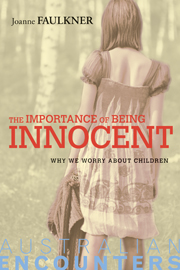Book contents
1 - Why do we worry about children?
Published online by Cambridge University Press: 05 July 2011
Summary
Baby on board
Worrying about children is a national vocation. When I had my first child, I was technically an adult. But I looked young, and remember hearing older women tut tut in the street. ‘Look,’ they would say, ‘children are having children these days.’ In many ways I was still a child, as are many first-time parents right up until the moment they stake a claim on the audacious conceit of parenthood: here is a person I am ultimately responsible for, and about whom I will worry until my dying day. This realisation, through which one finally – just in time or perhaps a little too late – takes on the mantle of parenthood, is supposed to extinguish the last remnant of one's own childhood. The moment of worrying about children is, for the parent, adulthood's defining moment. It marks an irrevocable passage: at once an assumption of duty, and the loss of an innocence that, sadly, we didn't know we possessed.
This book is concerned with this relationship between the worry about children and adult identity. Although there are obviously other ways of experiencing adulthood than as a parent, the parent–child axis increasingly regulates our ideals of legitimate social participation. Fear for children and childhood, especially, is a significant feature of contemporary Australian self-awareness. We are aware of the risks posed to children today because these concerns are continually worked over in our newspapers and weekend magazines, on radio and television, and even in parliament.
- Type
- Chapter
- Information
- The Importance of Being InnocentWhy We Worry About Children, pp. 1 - 18Publisher: Cambridge University PressPrint publication year: 2010



